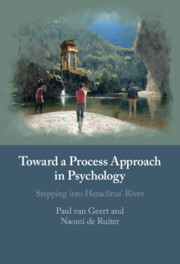Book contents
- Toward a Process Approach in Psychology
- Toward a Process Approach in Psychology
- Copyright page
- Contents
- Figures
- Acknowledgments
- Introduction
- Chapter 1 Change, the Final Frontier
- Chapter 2 A (Selected) Foundation for a Process Approach
- Chapter 3 The Goal of Socrates
- Chapter 4 Esteeming Entities
- Chapter 5 A Person Acting amongst Persons
- Chapter 6 Cliffhangers and Utilitarian Infants
- Chapter 7 Causes, Kings, and Interventions
- Chapter 8 (Compl)explanation and King Alfonso’s Lament
- Chapter 9 What’s in a Name?
- Chapter 10 (Un)Certainties
- Chapter 11 Troubled Waters of Heraclitus’ River?
- Chapter 12 Psychological Science as a Complex Dynamic System
- Glossary
- References
- Index
Chapter 4 - Esteeming Entities
Enacting a Substance Ontology in Self-Esteem Research*
Published online by Cambridge University Press: 14 July 2022
- Toward a Process Approach in Psychology
- Toward a Process Approach in Psychology
- Copyright page
- Contents
- Figures
- Acknowledgments
- Introduction
- Chapter 1 Change, the Final Frontier
- Chapter 2 A (Selected) Foundation for a Process Approach
- Chapter 3 The Goal of Socrates
- Chapter 4 Esteeming Entities
- Chapter 5 A Person Acting amongst Persons
- Chapter 6 Cliffhangers and Utilitarian Infants
- Chapter 7 Causes, Kings, and Interventions
- Chapter 8 (Compl)explanation and King Alfonso’s Lament
- Chapter 9 What’s in a Name?
- Chapter 10 (Un)Certainties
- Chapter 11 Troubled Waters of Heraclitus’ River?
- Chapter 12 Psychological Science as a Complex Dynamic System
- Glossary
- References
- Index
Summary
This chapter demonstrates how concrete practices align and form a praxis, using the field of self-esteem research as a case study – as one of the most popular concepts in both academic and pseudo psychology. The mainstream praxis of self-esteem research is dissected in the context of enacting a substance ontology. Here Aristotle’s distinction between particulars (i.e., primary substances) and universals (i.e., secondary substances) is applied as a way of making sense of various dominant practices in self-esteem research. The tendency to reify self-esteem is discussed, including how this relates to objectivist measurement-standards of self-esteem, an emphasis on predicting ‘levels’ of self-esteem, and a societal need and felt-responsibility to ‘boost’ self-esteem. I discuss how the mainstream praxis of self-esteem research demonstrates an attempt to position our field (and individual scientist identities) as ‘scientific’, thus revealing a (inaccurate) natural-science envy.
- Type
- Chapter
- Information
- Toward a Process Approach in PsychologyStepping into Heraclitus' River, pp. 61 - 85Publisher: Cambridge University PressPrint publication year: 2022
- 1
- Cited by

